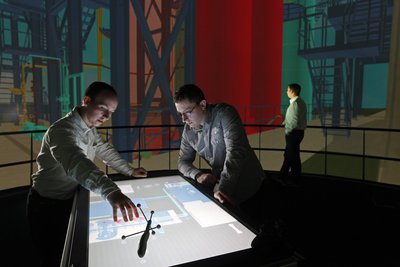Virtual plant planning, retrofitting and maintenance
Process plants have useful lives of 30 to 50 years, during which time they are routinely retrofitted. Virtual reality software simplifies and helps keep track of retrofit planning and testing. Fraunhofer researchers and BASF SE are jointly developing VR solutions for the plant life cycle.
With over 110,000 employees, BASF is the world’s largest chemical company. At its headquarters in Ludwigshafen, the company runs over 160 production facilities, two steam crackers, two gas and steam turbine power plants and one sewage treatment plant. Virtual technologies are helping make information and data on every plant on the premises available digitally to planning engineers, process engineers, assembly coordinators, safety experts and asset managers. A virtual copy of a plant displays every possible view, whether in graphics or figures, in drawings or simulations. This expedites and improves the planning and implementation of new plants or additions and retrofits.
Design reviews are an integral part of the planning process - a virtual model for design reviews realistically reproduces every component with the information related to it. The spatial representation makes hidden components or components aligned behind one another easily viewable.
“We reviewed the design of a process plant retrofit together with BASF experts,” reports Sabine Szyler, virtual reality specialist at the Fraunhofer Institute for Factory Operation and Automation IFF. “The space in the plant can be determined far more easily. What sounds so obvious is really a giant leap in perception.”

The design was reviewed in the Elbe Dom of the Fraunhofer IFF’s Virtual Development and Training Centre VDTC in Magdeburg.
“After all, the 6 m high, 360° projection surface projects a level of a plant which is virtually identical to the original. This gives viewers the sensation of standing directly in the plant,” explains the researcher.
The three-dimensional data from BASF’s planning tools, including the metadata of the plant’s individual components, were exported into the Fraunhofer IFF-researchers’ special virtual reality software - the Virtual Development and Training Platform. This enabled plant operators, plant planners and their colleagues, such as piping contractors, equipment and instrument engineers, steel building contractors or safety supervisors to view details of the plant faithfully reproduced at full scale in the virtual model and clarify many questions such as whether all of the operating elements are easily accessible or all the safety valves are easily operated during an inspection.
“We are so impressed by the design review with virtual reality that we have set up two VR stations in Ludwigshafen. That enables our planning teams there to review designs of other plants any time,” says Axel Franke, Senior Engineering Manager at BASF.
A retrofit plant performs differently than it did previously and, in the worst case, incorrect operation could bring all plant operation to a complete standstill. Continuous safety training is therefore a top priority in chemical plant engineering. A virtual interactive learning environment is already being used for training in Ludwigshafen. Fraunhofer experts designed a scenario for the retrofit of a nitric acid plant, which enabled the team of operators to inspect and get acquainted with the plant before its commissioning. The Fraunhofer experts set up a mobile VR training station directly in the control room. The training module presents the complete 3D model of the plant. All of the metadata such as serial numbers, temperatures, pressures and media as well as training materials can be viewed. Workers were able to familiarise themselves with its new operation, identify new access points and learn new safety regulations.
The experts from BASF and the Fraunhofer IFF agree that plant engineers will be unable to operate internationally in the future without virtual technologies. BASF is working on intensifying its use of virtual technologies in the future in order to maintain its leadership among chemical plant operators. The Fraunhofer IFF will continue providing conceptual support.
Solar-powered desalination system requires no additional power
MIT engineers have built a new desalination system that runs with the rhythms of the sun.
Climate-friendly electricity from ammonia
Researchers the Fraunhofer Institute have developed a high-temperature fuel cell stack that can...
Digitalised, sustainable battery cell production
German researchers have developed a flexible winding system for battery cells that is embedded in...












